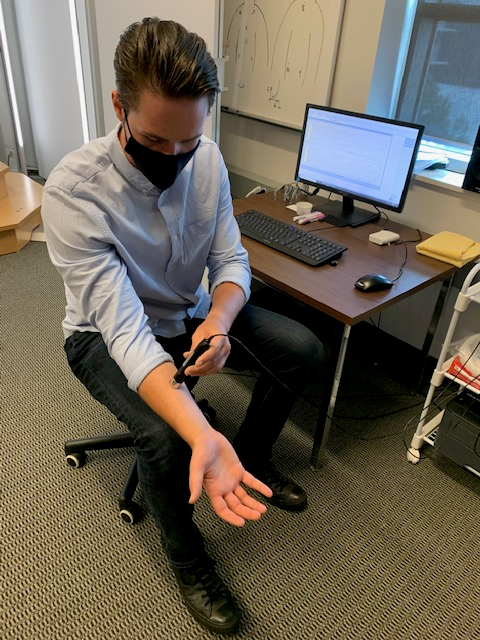Profile: PhD Student Tests His Comfort Levels
It was second year for Pearson Wyder-Hodge at UBC in Computer Science (CS) when he registered in a course that changed his destiny.
The course was Intro to Psychology. And he loved it.
Ultimately, that course led Pearson to switch gears in third year to the Cognitive Systems Program (COGS). COGS is a multi-disciplinary undergraduate program involving Computer Science, Psychology, Linguistics and Philosophy. “It’s hard to believe I’m now doing my PhD!” laughs Pearson.
Not only is Pearson a Neuroscience PhD student at UBC, he’s been a Research Assistant in the Sensorimotor Systems Lab of the CS Department for over four years. Once Pearson began working with Dr. Dinesh Pai, who runs the lab, he grew more fascinated with the research work Dinesh was doing. Pearson began his masters in Neuroscience in the fall of 2017, supervised by Dinesh.
Today, Pearson’s PhD research involves the mechanosensation of light touch. He’s studying the mechanical properties in the skin like elasticity and friction in terms of how soft contact interacts with the particular mechanoreceptors across the body that correlate with feelings of comfort.
 The resulting applications can be vast, such as optimizing the feel of compression fabrics for elite athletes, augmented reality glasses, heart monitors and the comfort and fit of wearables. Having a better understanding of how two surfaces interact with each other allows researchers like Pearson to advise product engineers to help them improve long-term comfort and wearability in their designs. Research techniques include motion capture, 3D body scanning, and psychophysics.
The resulting applications can be vast, such as optimizing the feel of compression fabrics for elite athletes, augmented reality glasses, heart monitors and the comfort and fit of wearables. Having a better understanding of how two surfaces interact with each other allows researchers like Pearson to advise product engineers to help them improve long-term comfort and wearability in their designs. Research techniques include motion capture, 3D body scanning, and psychophysics.
Pearson has already been co-author of a paper, The Human Touch: Measuring Contact with Real Human Soft Tissues, with Dr. Pai that was accepted at 2018 SIGGRAPH (premiere conference in computer graphics).
“I think most of my achievements come from the time and hard work I’ve always put into things,” explains Pearson. “Hard work can really make the difference between success and failure.”
To Pearson, the blend of neuroscience and computing is essential. "The brain’s structure is so complex with trillions of neural connections, that it's hard to understand the system exclusively using classical wet-lab approaches," he explains. "But computers super-boost the ability to build models of the body and brain to maximize our understanding."
A little advice for prospective students
“UBC is an incredible place to come for multiple reasons. It’s such a gorgeous campus with professors who are passionate about what they do,” Pearson explains. “It’s important to explore different avenues of research, especially in your later years of study. Try and collaborate with different people and determine what you really want to do.”
Perhaps what Pearson is trying to say is go outside your comfort zone. Something he's worked hard at doing for years.
Pearson Wyder-Hodge is Vancouver-born, doing his PhD in Neuroscience. Born and raised in Burnaby, Pearson now resides in the city with his girlfriend and 27 house plants. His passions at home include playing guitar, backcountry hiking, camping, outdoor activities and volunteer work. He has also been known to consume a king-sized pack of Twizzlers in under 15 minutes.
Pearson on LinkedIn: https://www.linkedin.com/in/pearson-wyder-hodge-3463371b2/